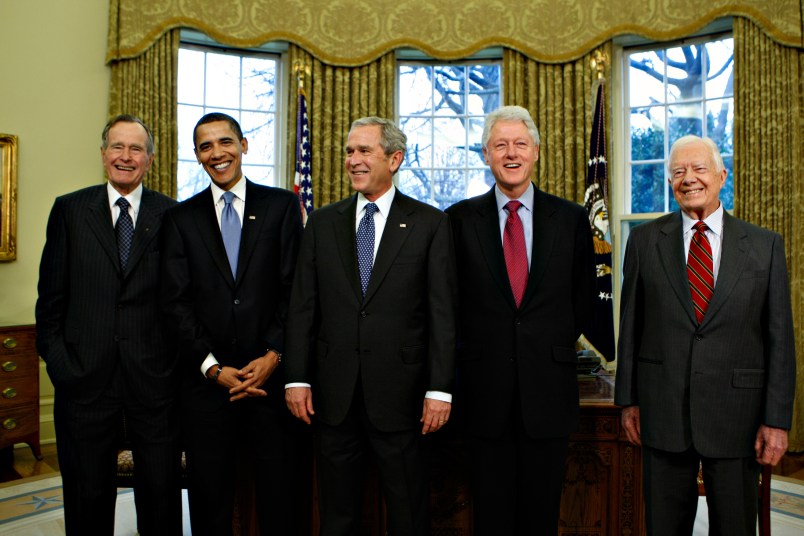In almost every discussion of the North Korea situation, I try to remind everyone that North Korea made its nuclear break out under George W. Bush – not under Bill Clinton and not under Barack Obama. A key part of that backstory is that over the course of the late 90s the US negotiated a series of agreements called the Agreed Framework which shuttered the North Koreans nuclear weapons program in exchange for a combination of commitments and aid. The Bush team argued that the agreement was ‘appeasement’ and that the US had caught the North Koreans cheating on the agreement during Bush’s first term. The cheating argument has always struck me as questionable – quite possibly true but questionable. But the bigger issue is this: Does any of this really matter today as more than affixing blame for a situation we have to grapple with today whoever is at fault? I would argue that it very much does. Here’s why.
It is important to have an accurate record of what happened in the recent past just on general principles. But understanding what happened in this case is quite important as a guide for future action both in the current Korea situation and with Iran and the nuclear agreements President Trump is trying to abrogate.
As I said above, I think the argument that the North Koreans were cheating on the Agreed Framework is questionable. The path the US was concerned about and which the Agreed Framework dealt with was a plutonium path to nuclear weapons. The cheating was allegedly about a uranium path. The North Koreans argued that the US hadn’t fulfilled key elements of the deal (with some reason). They denied cheating. Whether they were or not, I’m not really clear on. I’m not sure more informed people really know for certain either. What is clear though is that the Bush administration didn’t like the Agreed Framework and were looking for a reason to get out of it. The cheating allegation – which definitely may have been true – turned out to be that reason.
But the real reason wasn’t the cheating. It was the pretext. The Bush team didn’t like the concept of the deal itself. Giving things to the North Koreans to get them to do things we wanted was rewarding misbehavior, ‘appeasement’. The proper way to handle such a situation was to get them to fall in line by the threat of US power, which is to say US military power. This isn’t a crazy viewpoint. The North Koreans have used menacing or destabilizing actions to extract aid from great powers. In principle you should avoid rewarding ‘bad behavior’. Indeed, it was an unlovely arrangement. But even if there was some cheating in the background, the agreement demonstrably shuttered or at least stymied North Korea’s weapons development for years.
The simple reality was that the Bush team didn’t like the deal but had nothing to replace it with. The threat of force wasn’t credible because of the costs of a military confrontation which the North Koreans were well aware of. So the US got to act tough (or rather feel tough) and not go in for ‘appeasement’ and the result was that North Korea became a nuclear power. Might they have become a nuclear power anyway? Maybe. But it seems very hard to argue that they would have gotten there as quickly as they did or would even be there today if the US had continued with the quite minor amounts of aid the Agreed Framework required. He didn’t argue this specifically. But last night TPM Reader ML raised the possibility that our actions really don’t matter here at all, that North Korea’s behavior is driven by internal factors. This may certainly be true. But in that case we have no impact or influence regardless. (We tend to focus on North Korea’s ‘craziness’ but I think you can argue that their drive for nuclear weapons is highly logical.)
The real lesson I draw from this is that we should be extremely wary about actions which have the feeling or appearance of toughness but which are likely to have negative or even dire results because we have no viable, alternative policy. That seems very much like the situation we are moving toward with North Korea. Certainly it’s what President Trump was doing yesterday when he made wild threats he is highly, highly unlikely to follow through on. (Is President Trump really going to launch an all out nuclear attack on North Korea with all the horror, death and destruction in both Koreas, nuclear fall out in nearby states in retaliation for more verbal threats? Please.)
No less important, I’m quite certain that it is almost exactly the situation and folly that President Trump and his nuttier advisors are moving toward with Iran. We allowed Iran to do this. We gave them this money. For all this, in the future they could go ahead and build a bomb anyway. We haven’t actually ‘solved’ the threat, just postponed it. There are good rejoinders to each of these arguments. But there are merits to them too. But what’s the alternative? I would argue that in practice we have no real military alternative which is better than what we have now. And yet, we look likely to repeat the same mistake: taking the ego boost of feeling tough at the price of accepting a negative or perhaps catastrophic results. Refusing negotiation isn’t tough if you’re not actually willing to take up the alternative. Indeed, it is the most regular and orthodox military doctrine that threats only act as deterrents if they are credible. On both fronts, this is a lesson very much worth learning.






